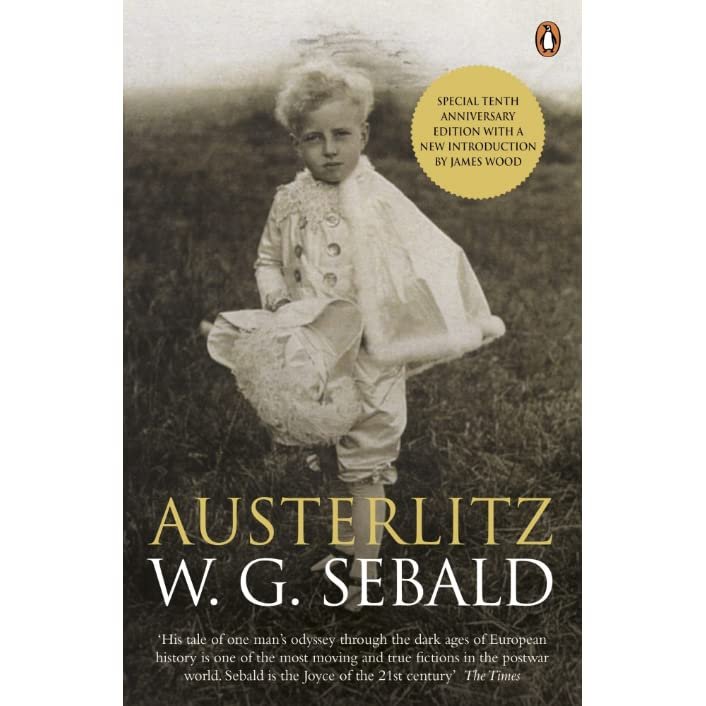Austerlitz

Rating: 3.9/5
Author: W.G. Sebald
Publisher: Penguin Books
Publishing Date: 4th July 2002
Language: English
Genre: War Fiction
ISBN-10: 0241141257
ISBN-13: 978-0241141250
Format: Hardcover
Pages: 432
Cost: Rs. 276.12 (Kindle Edition), Rs. 449 (Paperback)
Plot:
W.G. Sebald traces the moving and epic story of Jacques Austerlitz. Sent to Wales on the last Kinder transport from Europe on the eve of the Second World War, five-year-old Austerlitz is adopted by Welsh Calvinists, who decide to remove any trace of his true origins. Throughout his life Austerlitz is haunted by feelings of otherness, but it is not until retirement that he embarks on a journey to make sense of his curious early memories, taking the reader back into the heart of pre-war Europe.
Review:
The story reflects Austerlitz- recounting of his past, how he arrived in Britain in 1939 as a refugee, age four, from Nazi dominating Czechoslovakia, how he was adopted and raised by an older Welsh minister and his wife, how as an adult, he returned to Prague and located a close friend of his dispersed parents and how he further located the fate of his parents.
Sebold included many black and white photographs as part of his novel. This reminds us of what the art critic, Robert Hughes noted about the Holocaust: “photography captured the ghastliness of the atrocities in a way other forms of art could not.”
The narrative within a narrative is about identity and loss with the Holocaust as the backdrop. The narrator (unnamed) records conversations with Joseph (Jacques) Austerlitz whom he meets a couple of time by chance. This second narrator talks about his life before discovering his roots and point of origin and the improbable pursuit across the Czech Republic, Germany, and France to find memories of his mother and father. There were moments that defined the great Proustian beauty.
Austerlitz urges us to take a good look on the vanity of a man and certain innate qualities of human beings that are destructive. He wants our attention on how inhumanity is slowly destroying the world, killing innocent people. Though a fiction, it strongly presents all the ugly realities of war and the aftermath.
Much appreciated critic Michiko Kakutani wrote about the book: "We are transported to a memoryscape - a twilight, fogbound world of half-remembered images and ghosts that is reminiscent at once of Ingmar Bergman's Wild Strawberries, Kafka's troubling fables of guilt and apprehension and, of course, Proust's Remembrance of Things Past.''
Milestones of the Book:
- In the United States, Austerlitz won the 2001 National Books Critic Circle award for fiction and the 2001 Salon Book Award.
- In the UK, the book won the 2002 Independent foreign fiction prize and the 2002 Jewish Quarterly Wingate Literary prize.
- It was ranked 5th on The Guardian's list of the 100 best books of the 21st century.
About the Author:
Winfried Georg Maximilian Sebald (18th May, 1944- 14th December, 2001) was a German writer and academic. He was educated at the University of Freiburg. His works are largely concerned with the themes of memory, loss of memory, and identity (both personal and collective) and decay (of civilizations, traditions or physical objects). They are, in particular, attempts to reconcile himself with, and deal in literary terms with, the trauma of the Second World War and its effect on the German people.
His four novels are- Schwindel Gefühle (1990, translated by Michael Hulse as Vertigo in 1992), Die Ausgewanderten: Vier Lange Erzählungen (1992, translated by Michael Hulse as The Emigrants in 1996), Die Ringe Der Saturn: Ein Englische Wallfahrt (1995, translated by Michael Hulse as The Rings of Saturn in 1998), and National Book Critics Circle Award–winner Austerlitz (translated by Anthea Bell in 2001). His essay collections include Logis in einem Landhaus (1998, translated as A Place in the Country by Jo Catling in 2013) and Luftkrieg und Literatur (1999, translated in an expanded version by Anthea Bell as On the Natural History of Destruction in 2003).
In 1987, Sebald was appointed a chair of German literature at the University of East Anglia, and in 1989, he became the founding director of the British Centre for Literary Translation. At the time of his death, at the age of only 57, he was being cited by many literary critics as one of the greatest living authors, and was tipped as a possible future recipient of the Nobel Prize in Literature.















































